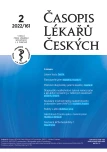Dietary habits in students from the medical faculties
Authors:
Hana Vařejková
Authors‘ workplace:
1. lékařská fakulta UK v Praze
Published in:
Čas. Lék. čes. 2022; 161: 94-96
Category:
Original Articles
Overview
The aims of this study were evaluation students' knowledge in the field of nutrition and to find out what their eating habits are, including the frequency of consumption of specific groups of foods. The research was made by the method of quantitative research. The questionnaire was thematically divided into 3 parts. Respondents filled in the
questionnaire online. The research showed that students' knowledge is insufficient. On the contrary, eating habits seem to be satisfactory even in comparison with students from all over the world. Two thirds of students are interested in the composition of their menu. Sufficient consumption of fruits, vegetables, cereals, and dairy products was
found. Meat consumption was superfluous. On the contrary, the consumption of legumes and fish was insufficient. Sweets, coffee, and caffeinated beverages are consumed daily by many students, whereas fast food and alcoholic beverages are consumed several times a month or occasionally. Students' BMI is mostly normal. Due to the lack of knowledge, more consideration should be placed on the teaching of nutrition to students at the medical faculties, especially in fields that do not primarily deal with nutrition.
Keywords:
medical students – Eating habits – nutrition – healthy lifestyle
Sources
- Crowley J, Ball L, Hiddink GJ. Nutrition in medical education: a systematic review. Lancet Planet Health 2019; 3(9): e379–e389.
- Brehm BJ, Summer SS, Khoury JC et al. Health status and lifestyle habits of US medical students: A longitudinal study. Ann Med Health Sci Res 2016; 6(6): 341–347.
- Barreiros Mota I., Castelo I., Morais J et al. Nutrition education in Portuguese medical students: Impact on the attitudes and knowledge. Acta Méd Port 2020; 33(4): 246–251.
- Perlstein R, McCoombe S, MacFarlane S et al. Nutrition practice and knowledge of first-year medical students. J Biomed Educ 2017 : 5013670.
- Pechová L. Stravují se budoucí lékaři lépe a jinak než jiní studenti? LF MU, Brno, 2009. Dostupné na: https://is.muni.cz/th/v6w9p/Diplomova_prace.pdf
- Kudlová E. Stravovací návyky a percepce jejich potřebných změn u studentů 1. lékařské fakulty Univerzity Karlovy v Praze. Hygiena 2000; 45(4): 224–231.
- Grygiel-Górniak B, Tomczak A, Krulikowska N et. al. Physical activity, nutritional status, and dietary habits of students of a medical university. J Sport Health Sci 2016; 12 : 261–267.
- Petrová J. Alternativní způsoby stravování vysokoškolských studentů v Brně. LF MU, Brno, 2008. Dostupné na: https://is.muni.cz/th/u7brn/DP.pdf
- Likus V, Milka D, Bajor G et al. Dietary habits and physical activity in students from the Medical University of Silesia in Poland. Rocz Panstw Zakl Hig 2013; 64(4): 317–324.
- Günes-Bayir A, Guney M. The assessment of nutritional and physical activity statuses in nutrition and dietetics and physiotherapy and rehabilitation students. Clin J Nutr Diet 2019; 2(2): 1–6.
- Hasamnis A, Patil S, Tun ZM, binti Ruslan NA. Nutrition and exercise habits amongst medical students in a private university in Malaysia. Proceeding of the 3rd International Conference on Public Health 2017; 285–292.
- El-Gilany A, Abdelhady D, El Damanawy R. Consumption and knowledge of fast/junk foods among medical students, Mansoura University, Egypt. TAF Prev Med Bull 2016; 15(4): 440–445.
- Mohanty BB, Rath K, Jena SK et al. Dietary habit of medical students: a study among the students of a health university in Eastern India. J Evol Med Dent Sci 2018; 22(7): 2698–2701.
- Janečková D, Dostál D, Plháková A. Kvalita spánku, cirkadiánní preference a zdravý životní styl u vysokoškolských studentů. Praktický lékař 2013; 93(3): 114–120.
- Hancocks N. ESPEN reveals manifesto to boost nutrition training in medical schools. Dostupné na: www.nutraingredients.com/Article/2020/01/22/ESPEN-reveals-manifesto-to-boost-nutrition-training-in-medical-schools
Labels
Addictology Allergology and clinical immunology Angiology Audiology Clinical biochemistry Dermatology & STDs Paediatric gastroenterology Paediatric surgery Paediatric cardiology Paediatric neurology Paediatric ENT Paediatric psychiatry Paediatric rheumatology Diabetology Pharmacy Vascular surgery Pain management Dental HygienistArticle was published in
Journal of Czech Physicians

2022 Issue 2
- Advances in the Treatment of Myasthenia Gravis on the Horizon
- Possibilities of Using Metamizole in the Treatment of Acute Primary Headaches
- Metamizole vs. Tramadol in Postoperative Analgesia
- Metamizole at a Glance and in Practice – Effective Non-Opioid Analgesic for All Ages
- Spasmolytic Effect of Metamizole
-
All articles in this issue
- ÚVODEM
- EDITORIAL
- Liver tests
- Diagnostic methods of fatty liver diseases
- Liver elastography
- Metabolic dysfunction-associated fatty liver disease (MAFLD) as a more accurate name for NAFLD – common aspects of pathogenesis
- Diagnosis of non-alcoholic fatty liver disease and its active screening in risk groups
- An overview of current therapy options of non-alcoholic fatty liver disease
- Statins and liver
- Alcohol-related liver disease in medical practice
- Current hepatitis C therapy
- Klinická obezitologie – nejen Základy
- Dietary habits in students from the medical faculties
- Za profesorem Peterem Krištúfkem, čestným prezidentem SLS
- Journal of Czech Physicians
- Journal archive
- Current issue
- About the journal
Most read in this issue
